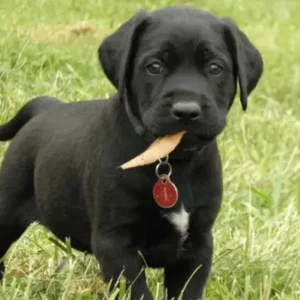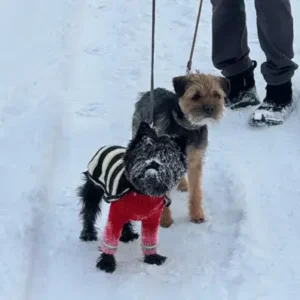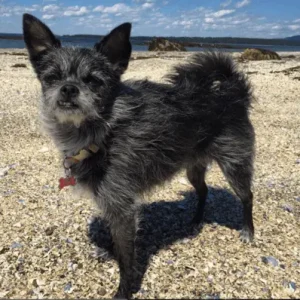Bugg Dog History/Origin
The Bugg is a hybrid dog breed, and because it hasn’t been around for long, there isn’t much information on its exact origin. However, we can learn a lot about Buggs by looking at their parent breeds, the Boston Terrier and the Pug.
The Boston Terrier, often called the “American Gentleman,” is friendly and cheerful. This breed likely came from mixing the Bulldog and White English Terrier, which explains their coloring and small size.
Originally known as the Bull Terrier, the name changed to Boston Terrier in 1889. Bred in the U.S., Boston Terriers have always been loyal, happy dogs.
-
Boston Terrier- Source: AKC.org
The Pug, on the other hand, comes from China and was brought to Holland by Portuguese traders in the 16th century. The Pug became popular in European royal courts and was especially loved by English royalty in the late 1600s.
The American Kennel Club recognized the Pug as an official breed in 1889. Their small size and affectionate nature have made them a beloved pet ever since.
Pug- Source: Pixabay
Bugg Dog Personality
The Bugg is a delightful mix of traits from both the Pug and Boston Terrier, resulting in a loving and playful companion. With the Boston Terrier’s clownish charm and the Pug’s energetic yet cuddly nature, Buggs are easy-going and affectionate. Their fun-loving personalities make them wonderful companions for families, kids, and other pets.
- Potential Challenges
Although Buggs are typically easy to train thanks to their fun-loving nature, they can sometimes exhibit territorial behaviors and excessive barking. This may arise when they feel protective of their home or family, or if they aren’t properly socialized with other animals or people.
These behaviors can become problematic if not addressed early on. Additionally, Buggs may have a stubborn streak, especially during training, requiring patience and consistency.
However, with early socialization, positive reinforcement, and structured training, these challenges of every dog breed can be managed. Regular interaction with different environments and people will help them grow into well-adjusted, well-behaved pets.
Bugg Dog Physical Appearance
Its dark face, curled tail, and floppy ears, inherited from the Pug, blend seamlessly with the signature large, bulging eyes of both parent breeds. This mix creates a playful, adorable, and slightly goofy look that’s sure to bring joy to any home.
- Size
Since the Bugg is a relatively new mixed breed, there aren’t strict size standards yet. However, being a cross between two compact breeds—the Boston Terrier and the Pug—you can generally expect them to be small. Most Buggs weigh between 10 and 25 pounds and stand about 14 to 18 inches tall at the shoulder. That said, some may be smaller or larger depending on the individual dog.
- Coat color
Bugg coats typically combine the traits of their Boston Terrier and Pug parents, resulting in a variety of colors and patterns. Common coat colors include brown, black, and white. Some Buggs may have solid-colored coats, while others display a mix of colors. A few even inherit the Boston Terrier’s signature tuxedo pattern.
Brindle Bugg Dog-Souce: furgremlins
Black and White Bugg Dog-Souce: emilyvervaeke19
Bugg Dog Gender Differences
Male and female Buggs are generally similar in personality, with both being affectionate and playful. However, males may be slightly larger and more energetic, while females can be a bit more independent and reserved. Overall, any differences tend to be subtle and vary more by individual temperament than gender.
Bugg Dog Feed/Nutrition
A proper diet for a Bugg should cater to the needs of a small, high-energy breed. The ideal amount is 1 cup of high-quality dog food per day. Although Buggs enjoy lounging around, they can easily gain weight if overfed.
So it’s important to maintain a consistent feeding schedule and avoid leaving food out all day. While treats are great for training, it’s best to limit their quantity. Bananas can be a healthy treat for your dog, packed with vitamins, but should be given in moderation to avoid excess sugar.
As your Bugg grows from puppy to adult and into their senior years, their dietary needs will change. It’s always a good idea to consult your veterinarian for personalized recommendations based on your dog’s weight, energy level, and overall health.
Bugg Dog Health
The Bugg breed can be susceptible to some health issues shared with the Pug and Boston Terrier. While most Buggs are generally healthy, they may face certain ailments, making regular veterinary care and good overall health management essential. Some common health concerns in Buggs include:
- Brachycephalic Syndrome: As a mix of the Pug and Boston Terrier, Buggs are prone to brachycephalic syndrome, which affects short-nosed or flat-faced dogs. This condition can lead to respiratory difficulties, sleep apnea, and other health problems related to the skull and respiratory structure.
- Cataracts: Cataracts, characterized by clouding of the eye’s lens, are a frequent issue in Buggs, as both parent breeds are also predisposed to this condition. If not addressed, cataracts can result in vision impairment or blindness.
- Patellar Luxation: Buggs may experience patellar luxation, which is the dislocation of the kneecap, due to their inherited skeletal structure. This condition can cause lameness, and pain, and potentially lead to arthritis if not treated promptly through surgery or other interventions.
Bugg Dog Care and Grooming
Buggs don’t require extensive exercise, but they can easily gain weight if they overeat even slightly. To keep them healthy, aim for at least one good walk of 30 minutes to an hour each day, along with several active play sessions to keep them engaged.
Additionally, it’s important to check their ears daily for debris or pests and clean them as advised by your vet. Nail trimming is essential too; ideally, you should do this once or twice a month to prevent them from clicking on the floor, and your groomer can assist with this task.
As a brachycephalic breed with their cute, flat faces, monitoring your Bugg’s respiratory health is crucial. Daily tooth brushing is also recommended, as small breeds are prone to dental issues; your vet can guide you on the best techniques for maintaining your dog’s dental hygiene.
Additionally, training your dog to sit is a simple command that can help manage their behavior and ensure they stay calm during grooming or checkups.
Bugg Dog Rescue Groups
When considering adopting a Bugg, it’s essential to look into breed-specific rescue groups for both Pugs and Boston Terriers, as these organizations often take in mixed-breed dogs like the Bugg. Many Buggs may find themselves in shelters or rescues due to their hybrid status, so checking local shelters and rescue groups can be a great way to find your perfect companion. Adopting a rescue dog not only provides a loving home for a pup in need but also helps support the mission of these organizations.
Bugg Dog Price
The price of a Bugg Dog typically ranges from $500 to $1,500, depending on factors such as breeder reputation, pedigree, and location.
If you’re interested in purchasing a Bugg, be sure to seek out reputable breeders who prioritize the health and well-being of their dogs. Since Buggs are a hybrid breed, it’s important to find breeders who are knowledgeable about both parent breeds—Pugs and Boston Terriers—and can provide health clearances and documentation for the puppies.
Interesting Facts
- Buggs are known for being quite vocal, often expressing themselves with a range of sounds beyond barking. They might “talk” or “grumble,” showcasing their playful personalities and desire for interaction.
Best For
The Bugg is an excellent choice for individuals or families looking for a loving and playful companion without requiring extensive exercise. Their friendly nature makes them great for homes with children and other pets, and their manageable size suits both apartment living and houses. However, they are best for those who can provide regular training, socialization, and attention to ensure they thrive as well-adjusted pets.
Top Names
| Male Bugg Names | Female Bugg Names |
| Buddy | Bella |
| Max | Daisy |
| Oliver | Lola |
| Winston | Ruby |
| Cooper | Zoey |








 Boston Terrier- Source:
Boston Terrier- Source:  Pug- Source:
Pug- Source: 

 Brindle Bugg Dog-Souce:
Brindle Bugg Dog-Souce:  Black and White Bugg Dog-Souce:
Black and White Bugg Dog-Souce: 







